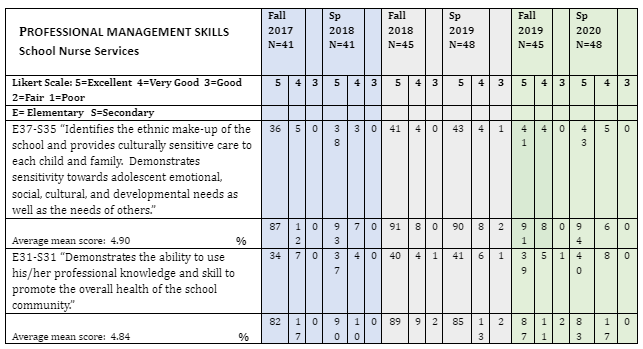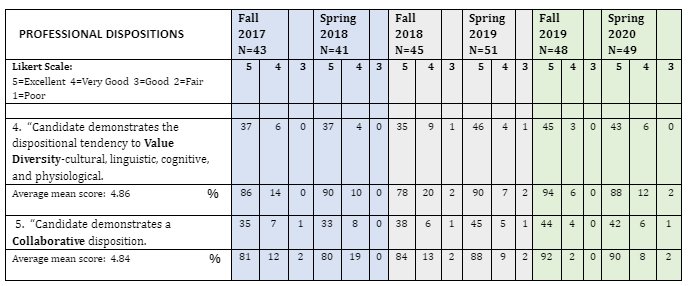AAQEP Accreditation
Standard 2 Aspect B
Standard 2: Program completers engage in professional practice in educational settings and show they have the skills and abilities to do so in a variety of additional settings and community/cultural contexts. Engage in culturally responsive educational practices with diverse learners and do so in diverse cultural and socioeconomic community contexts. (Health Office Environment, Special Education Assessment, Individualized Health Care Plans, Cultural Case Study)
School Nurse candidates learn to develop a sensitivity to cultural, ethnic, and/or socioeconomic differences needed to meet the health needs of students and their families. Factors such as migrant status, poverty, homelessness, and caring for students with special physical or mental health needs are impacted by the community where the school is located. School nurses must be familiar with community resources beyond the school setting to assist families in obtaining necessary health care and in some cases basic survival needs. Development of individualized healthcare plans for students take these factors into account in order for successful implementation. In a special education assessment, school nurses look at all factors of a student including growth and development, educational status, cultural beliefs, language abilities and health and wellness status.
- DATA Sources to be Introduced:
Preceptor Checklist of Skills and Competencies-Professional Management Skills (Form P106/P206) - Professional Dispositions (Form P104/P204)
- Employer/Supervisor Survey of Program Effectiveness (Employer/Supervisor Survey)
- N186: Practicum-Key Assignment: Special Education Cross Cultural Case Study
Data Source 1
Midterm and Final Semester Fieldwork Evaluation, Preceptor Checklist of Skills and
Competencies-Professional Management Skills (P106/206)
The first measure is the Fall semester (Elementary) and Spring semester (Secondary)
Fieldwork Evaluation, Preceptor Checklist of Skills and Competencies (P106/206)-Professional
Management, used by preceptors to evaluate candidates in their fieldwork knowledge
at two points.
Perspective: Preceptor
Specific Items Used for Analysis:
Items chosen to support culturally responsive practice include:
- Item 1: E37-S35 “Understands ethnic make-up of the school and provides culturally sensitive care. and Demonstrates sensitivity towards adolescent emotional, social, cultural, and developmental needs as well as the needs of others.” Example skills from the preceptor checklist: E19 and S24, S27, S29.
- Item 2: E31-S31 “Demonstrates the ability to use his/her professional knowledge and skill to promote the overall health of the school community.” Example skills from the preceptor checklist: E18, E24 and S14.
Definition of Success:
Candidates are rated on a 5-point Likert scale from 5 “Excellent” to 1 “Poor”. Our goal is for candidates to achieve an Excellent or Very Good rating.

Summary of Findings
From 2017-2020:
- E37-S35 scores show that 99% of candidates received an Excellent or Very Good rating
with 3 candidates receiving a Good rating. Zero candidates received a Fair or Poor
rating in application of culture.
Mean scores ranged from 4.88 to 4.93 with a mean average of 4.90
E31-S31 scores show that 98.5% of candidates received an Excellent or Very Good rating with three candidates receiving a Good rating. Zero students received a Fair or Poor rating.
Mean scores ranged from 4.82 to 4.88 with a mean average of 4.84.
Analysis and Interpretation
In Professional Management areas, 99% of candidates received an Excellent or Very
Good rating demonstrating school nurse candidates are perceived as having the ability
to design and implement a realistic plan for an overall school health program that
considers the uniqueness of population and cultural differences. Examples include
Health Office Environment, Special Education Assessments, Teen pregnancy counseling,
and Individualized Health Care Plans. In addition, candidates are perceived as having
the professional knowledge to promote the overall health of the school community such
as the establishment of immunization clinics and staff wellness programs.
Data Source 2
Professional Dispositions
The second measure is used by practicum preceptors to measure candidates' dispositions
or behaviors using a 5-point Likert Scale. Preceptors are asked to: “Circle the number
on the scale that reflects the most accurate description of student application of
dispositions.”
Perspective: Preceptor
Specific Items Used for Analysis:
Items Include:
- Item 1: #4: “Candidate demonstrates the dispositional tendency to value diversity-cultural, linguistic, cognitive, and physiological. (This disposition is critical to differentiating instruction and creating psychologically and physically safe helping/learning environments.)”
- Item 2: #5: “Candidate demonstrates a collaborative disposition. (The school nurse must collaborate/communicate meaningfully/effectively with other professionals, school site personnel, members of the community and families to effectively meet the health care needs of children/adolescents.)”
Definition of Success:
This measure is a 5-point Likert scale with Excellent to Poor ratings. Our goal is
100% of the candidates will measure an Excellent or Very Good on Dispositions.

Summary of Findings
From 2017-2020:
- Standard 5: 96% of candidates received an Excellent or Very Good in the ability to
collaborate. Four candidates were perceived as Good and zero candidates were rated
Fair or Poor.
Mean scores ranged from 4.79 to 4.91 with an average of 4.84. - Standard 4: 99% of candidates received an Excellent or Very Good in the ability to
value diversity. Two candidates were perceived as Good and zero candidates perceived
as Fair or Poor.
Mean scores ranged from 4.86 to 4.93 with an average of 4.86.
Analysis and Interpretation
Preceptors rate candidates overwhelmingly positive on diversity areas. Indicators
#4 and #5 show that 96% of candidates engage in culturally responsive educational
practices with diverse learners and 99% do so in diverse cultural and socioeconomic
community contexts.
Data Source 3
Employer/Supervisor Survey of Program Effectiveness
The Employer/Supervisor Survey of Program Effectiveness is given to District Health
Services Administrators who supervise program candidates in the workplace. These
aspects look at how the program prepares candidates in assessment areas to improve
and support a students’ ability to learn. This is mailed out one year after a candidate
completes the SNSC program. The number of responders providing feedback was very
low. Supervisors are asked to: “Rate the following program standards related to the
programs’ effectiveness in preparing professional school nurses.” Candidates are rated
on a 4-point Likert scale.
Perspective: Employers/Supervisors of Program Completers
Specific Items Used for Analysis:
- Standard 5: The program provides candidates with opportunities to further develop their understanding of the sociocultural context in which school nurses work. As part of these opportunities, candidates experience the range of diversity represented within the local community including culture, ethnicity, language, age, gender, gender identity, students with special needs, socioeconomic status and value systems.
Rationale:
These aspects look at how the program prepared completers to work with students from
all backgrounds.
Definition of Success:
The SNSC program is rated on a 4-point Likert scale with 4 representing Excellent
to 1 representing Poor. Our goal is supervisors will rate the program a minimum of
3.
| EMPLOYER/SUPERVISOR SURVEY OF PROGRAM EFFECTIVENESS | 2016 N=9 |
2020 N=13 |
||||
|---|---|---|---|---|---|---|
| SCHOOL NURSE SERVICES | Excellent |
Good |
Fair |
Excellent |
Good |
Fair |
| Program Standard 5: Social Cultural Context of School Nursing | ||||||
| The program provides candidates with opportunities to further develop their understanding of the sociocultural context in which school nurses work. As part of these opportunities, candidates experience the range of diversity represented within the local community including culture, ethnicity, language, age, gender, gender identity, students with special needs, socioeconomic status and value systems. | 66% |
22% |
11% |
77% |
23% |
0% |
Summary of Findings
In 2016, The Employer/Supervisor Survey perceived 88% of the SNSC Program candidates
as having successful experience in the cultural, ethnicity, language, age, gender,
identity, students with special needs and socioeconomic status and value systems represented
within the local community. 100% of candidates were perceived as understanding these
diversity areas in 2020.
Data Source 4
Nursing 186 Key Assignment- Special Education Cross Cultural Case Study
Nursing 186 is a practicum course allowing school nurses to place a major focus on
the impact of culture on students, family, and community. Although diversity and
cultural areas are addressed in Nursing 137, Nursing 184 and Nursing 186, the major
assignment addressing cultural areas is the Cross Cultural Special Education Case
Study. The subject of the case study must be a special education student in a culture
outside of the candidates own. The candidate explores cultural impact on health beliefs
and practice. The purpose of this assignment is two-fold:
- To gain a broader perspective and more in-depth understanding of the SST (Student Study Team)/ IEP (Individual Education Plan) assessment team
- To strengthen cultural understanding
Perspective: Program Faculty
Rationale:
A thorough health assessment is part of the cultural case study and must include general
health status, vision, hearing, dental, dietary habits/nutritional status, etc., while
sensitive to cultural norms. An IHP (Individual Healthcare Plan) and/or referral/follow-up
on any health problems and nursing interventions must be included.
Definition of Success:
Candidates are expected to achieve an GPA of 3.00 or a “B” grade in Nursing 186.
Mean Grades in courses focusing on culturally responsive practice:
| Mean GPA | 2017 | 2018 | 2019 | Combined |
|---|---|---|---|---|
| Nursing 137-Teaching Strategies | 3.86 | 3.89 | 3.89 | 3.88 |
| Nursing 184-School Nurse Seminar I | 3.71 | 3.79 | 3.92 | 3.04 |
| Nursing 186-School Nurse Practicum I | 3.83 | 3.84 | 3.94 | 3.87 |
| Nursing 187-School Nurse Practicum II | 3.93 | 3.88 | 3.94 | 3.91 |
Mean GPA in Cross-Cultural Special Education Case Study
| Mean GPA | 2018 | 2019 | 2020 | Combined GPA |
|---|---|---|---|---|
| N186 Cross Cultural Case Study Assignment | 93% N=51 |
98.6% N=49 |
97.3% N=49 |
96.3%=A |
Analysis and Interpretation
Mean data scores in Nursing 186 ranged from 3.83 to 3.94 with a combined mean of 3.87.
Candidates across all cohorts and courses performed at high levels with mean grades
3.00 in all courses demonstrating acquisition of knowledge related to culturally responsive
practice.
Analysis of Standard 2b Findings
The School Nurse Services Credential program is successful in introducing and supporting
candidates in diverse psycho-social situations in the school and community providing
the knowledge and skill to engage in culturally responsive practice with diverse learners
and in a culturally diverse and socioeconomic community context. Employers perceive
that SNSC program candidates have experienced the range of diversity represented within
the local community including culture, ethnicity, language, age, gender, gender identity,
students with special needs, socioeconomic status and value systems and feel comfortable
working with students, staff and families.